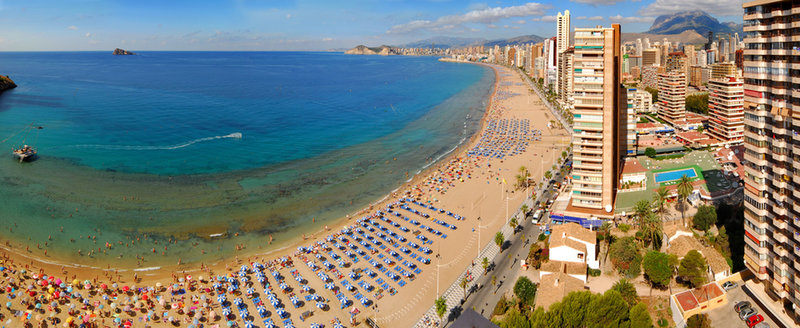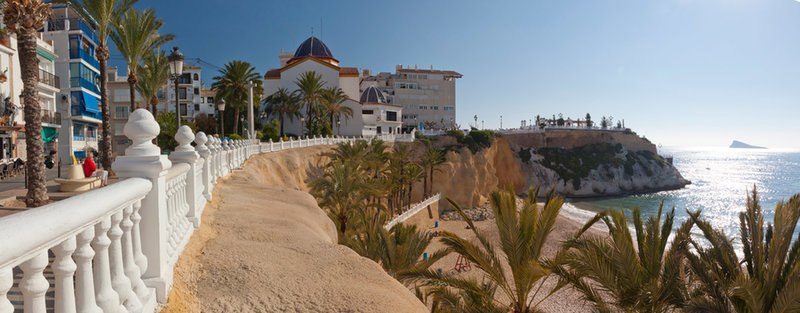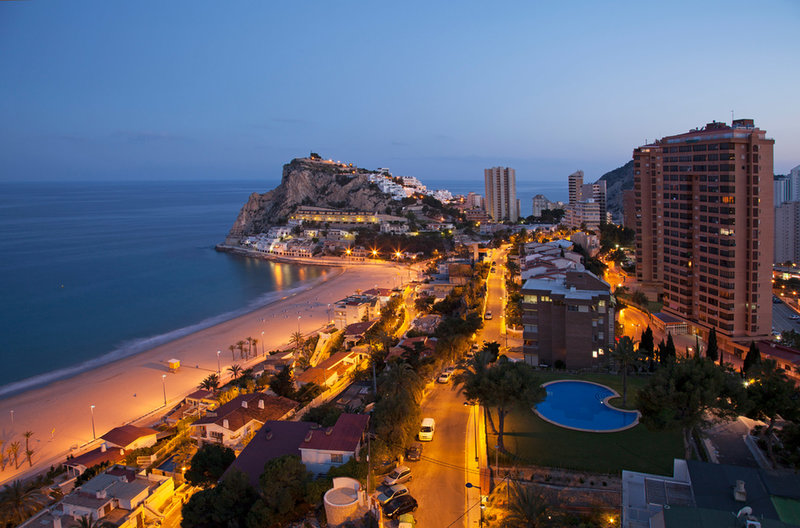Insight
Benidorm at a crossroads
Benidorm has become a haven for British holidaymakers, with guests flocking in their thousands to enjoy some fun in the sun. However, the uncertainty of the 2020 holiday season has left the Costa Blanca fishing town at a crossroads and notable hotel owners are calling for hotels to move more upmarket and away from its ‘cheap resort’ reputation. Alex Love finds out what an upmarket hotel industry in Benidorm could look like and what it would mean for the surrounding area.

B
enidorm has a reputation as a cheap and cheerful destination for some sun, sea and sangria. But the ongoing coronavirus pandemic has had a devastating impact on an economy that is heavily reliant on tourism. And due to its popularity with British tourists, the uncertainty surrounding Brexit also puts a question mark over Benidorm’s future.
Yet both these issues present opportunities for hotel owners in the region to explore different ways to operate when things start to recover.
One proposal for life on the other side of Covid-19 and Brexit has been to transform Benidorm into more of an upmarket destination. One of the most prominent voices for this change is José María Caballé, CEO of Servigroup Hotels, which owns 18 hotels in the region. Caballé argues that Benidorm must move away from being a place that tourists just go to get drunk for a few nights - but added that there was no quick fix.
“It's not easy to answer. It is a complex problem that Benidorm is suffering,” he explains. “To know the situation of Benidorm and its tourist market, you have to know the area of the city and its region, climate, orography, philosophy of its citizens and its political managers, with which it takes a long stay to understand the situation.”
A consequence of the pandemic is that people are more likely to place a greater value on personal space and hygiene, so may be prepared to spend more on accommodation. However, changing a reputation such as Benidorm’s is not something that can be done overnight - although the potential is there.
“With close proximity to 5km coastal beaches, followed by stunning countryside and its own microclimate, Benidorm does hold the key natural attributes that could help it become an upmarket destination,” says Johanna Bonhill-Smith, GlobalData travel and tourism analyst. “If enough hotels and even local stakeholders are on-board with the shift to an upmarket destination, Benidorm may become more appealing for many as it has the natural resources, that coupled with quality and value may help divert the destination image to less of a mass tourism destination.”

Image Credit
Luxury on a budget
With more than 300 skyscrapers dominating the city’s skyline, it is hard to believe that Benidorm was once a fishing village with a population of just 3,000. The expansion has largely been driven by mass tourism. The boom began in the 1960s and has transformed the area of Costa Blanca to be almost unrecognisable. In a standard year, overnight stays in hotels total more than 11 million, with half of these foreign tourists and the majority being British.
Part of the appeal of Benidorm is that money goes much further than in other parts of Spain. A stay in a four or five star hotel in Benidorm is far cheaper than Barcelona or Madrid, for example. However, there is some way to go. According to Booking.com, the city has 492 three-star accommodation options available, compared with 153 hotels rated four or five stars.
Yet the amount offour and five star hotels has been growing. Twenty five years ago, Benidorm had no five-star hotels. It now has three, along with an increasing number of four-star establishments. This is perhaps some indication that Benidorm’s shift to a more upmarket destination may in fact already be underway.
Something very curious about Benidorm is that the hotel owners are people from Benidorm.
Another factor that works in the city’s favour is that many hotels are owned by people originally from Benidorm with an in depth understanding of the area.
“There are a lot of local owners of hotel establishments. The penetration of hotel chainsin Benidorm is a relatively small compared to other Mediterranean destinations,”says Josep Ivars Baidal, professor in geography and tourism from the University of Alicante.
Local hotel owners also have more of a personal investment in the area and are considered less likely to sell up when times are tough.
“They are renovating all the time, which is very important also. Because something very curious about Benidorm is that the hotel owners are people from Benidorm, who have lived here all the time; we don't have a lot of abroad chain hotels,” adds Sergio Frau, who works in marketing for Visit Benidorm. “People here in the hotels love the city. And that's why they invest all the time to renovate the hotel to implement new systems, to be much more sustainable.”
Nevertheless, it is unlikely that Benidorm will ever be able to compete with the likes of Monte Carlo or Italy’s Lake Como as the preferred holiday destination of the wealthy. What is more realistic is that Benidorm starts to attract greater numbers of middle-class holidaymakers seeking an affordable luxury break.

Image Credit
Changing Benidorm’s reputation
Reputations are easy to get and hard to lose. For too many people, their idea of Benidorm is hundreds of sunburnt British tourists stumbling out of bars in the early hours of the morning. This could put off the more introverted traveller who may take a keener interest in the outdoors than doing shots in bars.
There is a growing campaign by businesses within the city to shift its perhaps unfair perception and showcase the diverse tourism options the area has to offer, using digital marketing strategies to attract a younger generation of tourists.
“This has been our biggest challenge in the last few years. We have worked really hard trying to educate people,” explains Frau. He believes that Benidorm is a misunderstood holiday destination that is often judged harshly by people who have never visited it.
Rather than promoting leisure activities this will have to shift to accommodate the more ‘upmarket’ traveller.
“The problem is Benidorm is not just a place to party. Benidorm has many things to offer. And as I always say, we don't have just one Benidorm, we have several Benidorms in the same city. The thing is that you have to know where to go in order to find your Benidorm,” Frau adds.
Benidorm is surrounded by a mountainous region, making it a suitable destination for hiking and cycling. Nearby nature park Sierra Helada has seven peaks, covers 13,750 acres and is also a marine conservation area. In addition, the clear blue seas and sealife make Benidorm a cost-effective location for scuba diving.
This diversification campaign is also required to attract a broader base of tourists amid increased competition for Benidorm’s traditional clientele from heavily promoted budget 'sun and sea' destinations such as Egypt, Turkey and Morocco.
“Rather than promoting leisure activities such as booze cruises and pub crawls this will have to shift to accommodate the more ‘upmarket’ traveller – promoting luxury cruises and more gastronomical experiences such as wine tastings. From this shift in promotion, the surrounding areas may be likely to benefit as there is a vast natural offering alongside cultural pull – attractions such as the waterfalls of Algar and the medieval castle, Castell de Guadalest are unique to the area,” adds Bonhill-Smith.

Image Credit